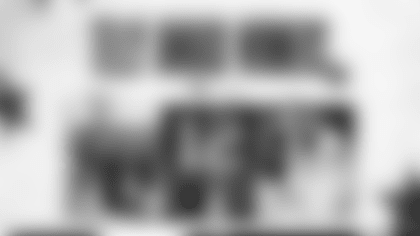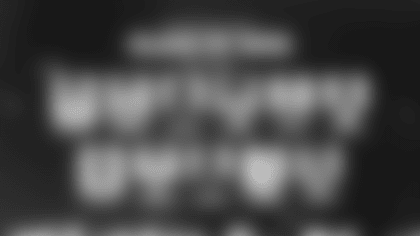[

]()
**B:** We didn't make any transactions with Tony Gaiter today, that situation is status quo. The more I watch Corey Dillon the more I think he reminds me of James Wilder. I know that is maybe not a household name, but when he was with Tampa in the late 70's and early 80's he was a tremendous force as a running back and I think that is the guy the Corey Dillon really reminds me the most of because of his power and the physical way that he plays. I don't know if any of you saw Wilder play, but he was a load. I addressed our team this morning about responding from the way that we played in Cleveland and we have been talking about it all week. I hope that within the next 48 hours that our focus will be where it needs to be and that what happened last week was an aberration not any kind of pattern and that is certainly what we are striving for to make that a one time thing. That has been a heavy emphasis this week and hopefully that is the way it will be on Sunday that we will respond from it. That is a big challenge for our team and for all of us. So that is what we are working toward is to eliminate that type of performance.
Q: How can you tell that they get the message?
B: Sunday afternoon by 4:00 I think we will know.
Q: Does that mean that last week they didn't get the message?
B: Based on where we were at 4:00 last Sunday afternoon I would have to say no that we didn't play anywhere near the level or the way we need to play. I feel pretty confident that if we play the way that we played last Sunday we will get the same results maybe worse.
Q: Anything changed with the quarterback position on the depth chart from last week? I know John (Friesz) was downgraded to questionable.
B: Yes he is not moving real well out there. He can still function a little bit. It could if he is not really able to be efficient it could change.
Q: And is it still the same with the third and fourth guys as it was last week?
B: Yes I think we will just have to evaluate how functional John can be. I don't think anything else has really changed.
Q: But that would be Brady moving up to number two?
B: Yes.
Q: How are the rest of them, has (J.R.) Redmond practiced?
B: Redmond is still questionable. He did more yesterday. He didn't practice, but he did more he ran and did a lot more than he did on Wednesday. If he can practice today than I think he would have a chance to do something in the game. If he can't practice today then I think he probably won't play.
Q: What about Ted (Johnson)?
B: Ted is very similar to J.R. He did more yesterday than he did on Wednesday. He did not practice with the team so yes same scenario today.
Q: What about Willie (McGinest)?
B: Willie practiced Wednesday and Thursday so he would be ahead of J.R. and Ted.
Q: Are you concerned long term about those two (Ted) Johnson and (Willie) McGinest because they have missed so many games over the last couple of years due to injury?
B: You don't like for any players to miss games unfortunately that is a part of football that every team has injuries, every team has players that miss some games. At this point in time I don't think there is really much to do other than try to manage the situation the best we can and try to get everybody as healthy as possible and perform as well as possible. When we get to the end of the season then maybe you take a different look at things. Now that Mike Woicik has had a year working with those guys that maybe there is something that we could do a little bit differently that could improve their durability. Maybe there isn't, we are managing the situation and trying to do as much as we can right now, but I think looking long-term their might be some off-season things that we might want to consider and we will do that when the time is appropriate.
Q: Can I ask you a general question about the salary cap, hypothetically a player signs five year extension with a ten million dollar signing bonus but it is layered meaning up front he receives eight million. In two years the team can bring him back for the final three years of the deal and give him the other two million dollars, what is the pro-ration of that signing bonus? Is it two across the whole five years or is it four million in each of those first two years and then the third year give him the rest?
B: Like a lot of other things in the contract there are different ways and different options to do it depending on how you are trying to do it. It would depend on specifically how the contract is worded…
Q: How you give them that second part of the money whether it is a roster bonus or an incentive, or a signing bonus?
B: Right there are a number of different ways you can do it, it is just a question of trying to manage, as you mentioned from a salary cap standpoint when the money comes into play or how it is earned, whether it is earned on an incentive basis or roster, I mean there are a thousand things. That's a tough generic question.
Q: You see a guy like Lawyer (Milloy), a guy like (Tony) Brackens, Terry Glenn?
B: I can only say that on some of the contracts in this league I think you really have to look at the fine print and truly analyze the contract because we have had many discussions where you will sit in a meeting and say, 'What about so and so, he signed a ten million contract for five years.' 'Well but that's not what that is.' Then an hour later maybe you understand, 'Okay well this is really what that contract is, that's what it was advertised as but that's not really the deal' or vice versa sometimes you say, 'How could they sign that guy for that little?' 'That's not really that little, here is the rest of the deal' and there are so many variables in there…
Q: Well let's say that second part kicks in as a roster bonus, then is it four million over those first two years and then seven and change those last three?
B: Let me take a pass on the question because it would specifically depend on a lot of the criteria, in other words a roster bonus isn't always treated the same way or a signing bonus, as you mentioned, isn't always treated the same way. Whether there is an option year or what they call fake years at the end of the contracts and all of that and that really in all honesty is not my area of expertise anyway. The people who do that spend an awful lot of time conversing with the league and understanding the rules and the treatment of all the different contracts and so forth. I usually get the Reader's Digest version of that from those guys anyway and don't totally understand it at that point either. I mean I understand the concept of it, but the actual mechanics of it and all that is not really my field.
Q: How deep is your role in this? Obviously you say 'We need to sign this guy long-term', but does it end there?
B: I think as a coach you have to have an understanding of what you are doing and what your commitments are from a business standpoint, but the mechanics of it and the specifics of it and all of that that is not what I do and again that is an area that changes. I don't want to say that it changes a lot, but it definitely changes. As teams do different things with different contracts and everybody understands, 'Okay this is the way it is going to get treated or this team did this with this other player.' 'Oh that's a good idea maybe we could do…' you know those types of things. There are always new variables. I mean I have experienced it every year since the salary cap came in, in 1993. Each year there are kind of new angles and new ways to look at things and you really have to stay on top of them. Just like trends on the field there are other trends in cap management and things that come up from a contractual standpoint that you have to stay on top of and they are unique and they are not really football-coaching things. Do I understand what the overall business part of the team is, yes in a general sense, basic incentives and all of that, but again it gets explained to me in English not "Capese" [that language].
Q: Are Andy (Wasynczuk) and Mike Tannenbaum different in the way they approach it?
B: I didn't run the cap in New York so that is different. I am in a different position here then I was in New York. I have spent a lot of time with Andy and I think he is excellent in his understanding of the business aspect of the team, not just in contracts but a lot of other matters that go into managing a team from a financial and a business standpoint. I think he has a lot of great ideas, he is very smart and I can't think of anybody better to work with than Andy.
[

]()
**Q: What about on the personnel side are you all set there? Have you talked with Any or Robert Kraft about getting more guys on the personnel side of it? You kind of came in this year and it was a shotgun situation you had to make decisions on the fly now that you have some time any thought to adding to your personnel staff? Again you don't technically have the title is that going to be addressed?**
B: Personally I am not really all concerned about titles I am concerned about winning football games. Organizationally we talk a lot about our philosophy in building a football team and how to improve the one we have and how to as we go through year by year long-term be as strong as we can possibly be. I think that transcends the whole organization and all the people that are part of it. Those are really what are objectives are and personnel decisions fall within that overall philosophy of there needs to be sound reasoning behind the decisions what we are trying to do and it needs to fall into a certain blueprint of a plan. I feel like the ones we have made in the past year have fallen into that blueprint and that's what we are going to continue to do is try to build through a philosophy that can strengthen our team. Sometimes you have more options than others. In February we were in a situation where we were basically over the cap and had to release players to get under the cap. We have had to release players to continue to do transactions through the year. This coming year I don't think the situation will be quite that severe, but it will be similar. Then in the future hopefully it won't be that way, but whatever the constraints are that's what you have to work within.
Q: When you came in I am sure you assessed what was here and established a blueprint for what you wanted to do, how much has that changed with the 2-8 season and what you have seen on the field so far?
B: Sure it has changed some. I mean anytime you come into a new situation I think you want to try to avoid making a lot of big mistakes. There are a lot of things that you don't know that you need to find out and I know a lot more about this team then I knew in February, there is no doubt about that. I think moving forward that that information will be valuable and I am not saying that I have learned about it negatively, it's positively and negatively. The more you go through with people and a team the more you learn about them. There were a lot of players on this team that I didn't know at all, players that weren't here in 1996 that have been acquired by the team since then. That is part of the learning process, not only about each individual player, but also how they all fit together and how it meshes. I have learned a lot, not respective of the record but through a lot of experiences.
Q: Can players fearing for their jobs ever get to the point where it is negative in the locker room?
B: My philosophy has always been that the best motivation you can have is to do something because you want to do it. You can do something because somebody is holding a gun to your head, but I don't think that is the best way to do it. You can do something for a reward. If somebody gives you a big enough reward somebody will probably do that for a big enough reward, but then there is the real motivation, which is doing something because you want to do it. Doing something that is right just because it is right, not because of a big reward you are getting, or because somebody is holding a gun to your head with a finger on the trigger, but because it is what you want to do, it is something you believe in and you want to put your heart into it. That is the best way to motivate and I think that is where you get your optimum results. Not that you can't get results the other way because I think you can and there is a place for that, but in the end I think the highest form of motivation is to do it because it comes from the heart and because you want to do it. That's the optimum.
Q: How long does it take to learn that about a guy? I know when Bill Parcells was here in his third or fourth year he was talking about Bruce Armstrong and he got to know Bruce and Bruce got to know him. He knew that Bruce wanted to win and that's all that he needed to know about and that made some things acceptable from Bruce because he knew he was going out there to win. How long does it take to learn that from some of the guys?
B: That's a good question. I think to answer that question, in Cleveland, having gone through it once in Cleveland, it probably depends on the player a little bit, but it took a little while with some players to really get to the point that you are talking about maybe similar to the example that you gave. I am not saying that you can't get results before that point, I don't mean that in any way, but just in terms of having an extended relationship with a player is certainly preferable and in a lot of ways I think more productive than having a short one, not that you can't be productive on short ones, but guys that you have been with for a long time and coached for a long time there is a certain bond and a chemistry there that it works out better on both ends.
Q: By the same token there are some guys here, not star players, but guys on the lower half of the roster who are playing for their lives now, are they not?
B: I think everybody in this league is playing for their profession. This is not a charity league. It is not like college where you get a scholarship and you are there for four or five years on a scholarship and whatever happens you still have the scholarship. They can't take it away from you unless, there is very little you can do to lose that scholarship. This is a business, this league is all about performance, it is all about production and if you don't have it then you won't last too long in this league and if you do then there will be a place for you one way or another. I think that is the way it is for everybody. That's the way it is for rookies, veterans, coaches, personnel people, I mean you name it. I think it transcends every position. Either you are productive and you are producing or that's not going to last forever.
Q: Can you give us an update on the guard situation with (Joe) Andruzzi and (Adrian) Klemm?
B: Joe practiced yesterday and he practiced Wednesday so I think that he is, relative to a couple of guys that didn't practice, that he is a lot further ahead than they are. It is still questionable we will see how he is doing right up toward game time, but I think that he has a pretty good opportunity to play.
Q: How is Klemm taking the snaps?
B: It has been all right. He is a work in progress. He is learning out there. He sees things that are new and haven't happened before and doesn't handled them as well as things that he is more comfortable with that are more repetitious, things that have already been in part of the learning curve as opposed to starting a new one.
Q: Is there a comfort level where he could if he had to?
B: Yes if he had to go into play I think he could go in and play. He hasn't been in an NFL game and I don't think anybody knows what the results would be, but I think the preparation is coming along. I think he is a lot further along then he was four or five weeks ago when he started. There has been a lot of progress made. There is still a long way to go. Any time a rookie offensive lineman misses training camp, misses a few weeks of the regular season and jumps in, in the middle the current is going pretty fast and especially against a team like Cincinnati. They run a lot of stunts and blitzes and change up the fronts and do a lot of different things and it is a lot for the offensive line to be ready for. Some things out there he does pretty well with other things are new to him and he needs to see them and experience them and then get them better the next time.

























